by Genevieve Balance Kupang
Baguio City, Philippines – The “City of Pines” has taken steps towards a sustainable future with the launch of its first Voluntary Local Review (VLR) report held June 10, 2025 at the Ion Hotel. Guided by the mantra of “No One is Left Behind in Our Commitment Towards Sustainability,” Baguio City pioneered a comprehensive, inclusive, and data-driven approach to achieving the Sustainable Development Goals (SDGs). The event brought together diverse stakeholders, underscoring the collaborative spirit at the heart of Baguio’s sustainability journey. Key figures included Mayor Benjamin Magalong, who emphasized the “no one is left behind” philosophy, UNDP Resident Representative Selva Ramachandran; and representatives from the United Nations Development Programme (UNDP), Department of Economy, Planning, and Development (DEPDev), local government units, civil society organizations, academia, indigenous peoples, and the youth sector.
Dr. Selva Ramachandran lauded Baguio’s VLR as a “key milestone,” commending the city’s efforts and its trust and support for a truly inclusive process. He highlighted Baguio’s top-performing GDP among highly urbanized cities and emphasized leveraging AI to deepen human capacities for new development pathways.
This landmark VLR, the first of its kind for a Philippine urbanized city, serves a report and a roadmap for the City we all dream of — a place that is inclusive, livable, and creative. This vision reflects the hopes and voices of its people, aiming to build a city where everyone has the opportunity to thrive and no one is left behind.
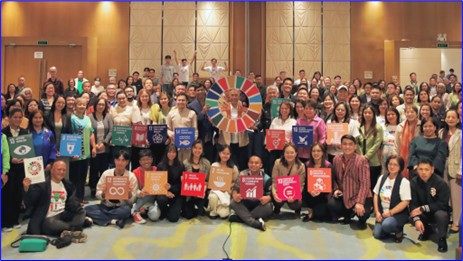 UNDP Philippines, Baguio City multi-stakeholders representatives who joined the Voluntary Local Review Launch last June 10, 2025. Photo credit: UNDP Philippines.
UNDP Philippines, Baguio City multi-stakeholders representatives who joined the Voluntary Local Review Launch last June 10, 2025. Photo credit: UNDP Philippines.
Baguio City sets a leading example of how urban centers can balance sustainable growth with environmental stewardship and community well-being by closely tracking baseline data—whether indicators are on track, improving, or in need of urgent attention.
A Deep Dive into Baguio’s Sustainability Blueprint
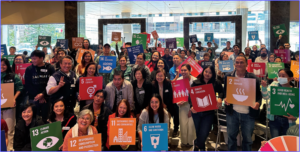 The First Milestone: Before the Voluntary Local Review launch, Baguio City held an Inception Workshop in August 2024, uniting key stakeholders to align national and local SDG perspectives and establish the SDG Core Group. This was followed by a two-day Data Collection Workshop in October 2024, where the group identified essential data needs, responsible offices, and baseline years. Photo credit: UNDP Philippines. (2025). Baguio City VLR on the SDGs, page 156.
The First Milestone: Before the Voluntary Local Review launch, Baguio City held an Inception Workshop in August 2024, uniting key stakeholders to align national and local SDG perspectives and establish the SDG Core Group. This was followed by a two-day Data Collection Workshop in October 2024, where the group identified essential data needs, responsible offices, and baseline years. Photo credit: UNDP Philippines. (2025). Baguio City VLR on the SDGs, page 156.
The VLR process, meticulously completed over nine months, involved extensive “deep listening exercises” to capture the true sentiments and lived experiences of Baguio’s citizens. This quantitative and qualitative data-gathering, co-created with stakeholders, forms the bedrock of the report, ensuring that solutions are rooted in local realities.
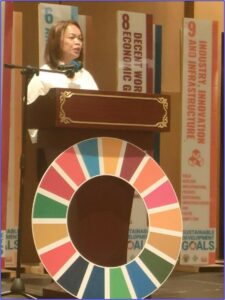 Architect Donna R. Tabangin of Baguio City’s Planning, Development, and Sustainability Office presents the Voluntary Local Review (VLR) report, highlighting the city’s progress on key Sustainable Development Goals—identifying areas on track, advancing, regressing or needing improvement.
Architect Donna R. Tabangin of Baguio City’s Planning, Development, and Sustainability Office presents the Voluntary Local Review (VLR) report, highlighting the city’s progress on key Sustainable Development Goals—identifying areas on track, advancing, regressing or needing improvement.
Architect Donna R. Tabangin, Baguio City Planning and Development Coordinator, highlighted that the VLR is more than just a compliance tool; it’s a framework for localizing global development agendas. The report provides a comprehensive assessment of Baguio’s progress across all 17 Sustainable Development Goals (SDGs), highlighting both significant achievements and areas requiring urgent attention. Overall, Baguio City is on a positive trajectory, with the majority of indicators either on track or showing progress. The VLR also showcases the city’s strengths and innovative initiatives, such as the success of communal gardens in enhancing food security and ongoing efforts to boost economic vibrancy and competitiveness.
However, the report also identifies challenges in several key areas, notably SDG 3 (Good Health and Well-being), SDG 8 (Decent Work and Economic Growth), SDG 11 (Sustainable Cities and Communities), and SDG 13 (Climate Action). She reported regressing health indicators (SDG 3). The city faces rising challenges from water-borne diseases, increasing rates of vascular and heart diseases, cancer, diabetes, and issues related to alcohol, tobacco use, and mental health. These require urgent and sustained interventions. Efforts are underway to promote healthier lifestyles and improve access to universal healthcare. There is also educational gaps. For example, while the cohort survival rate remains high, a concerning 85% dropout rate in Senior High School and unfavorable teacher-student ratios in critical fields such as engineering present significant barriers to educational attainment.
Ar. Tabangin also reported on underemployment (SDG 8). She said that despite a strong local economy and growing tourism, underemployment persists as a critical issue, underscoring the need for more inclusive and decent work opportunities for all residents. There is also the issue of environmental pressures (SDG 11 & 13). Challenges related to air quality, solid waste management—especially the city’s reliance on neighboring local government units for waste disposal—and climate action pose serious risks to Baguio’s long-term sustainability.
Architect Tabangin’s insights underscored the importance of the VLR as a dynamic tool for guiding policy and programmatic responses, ensuring that Baguio City continues to progress toward a sustainable, inclusive, and resilient future.
UNDP Philippines SDG Specialist Aljo Quintans’ Context Setting
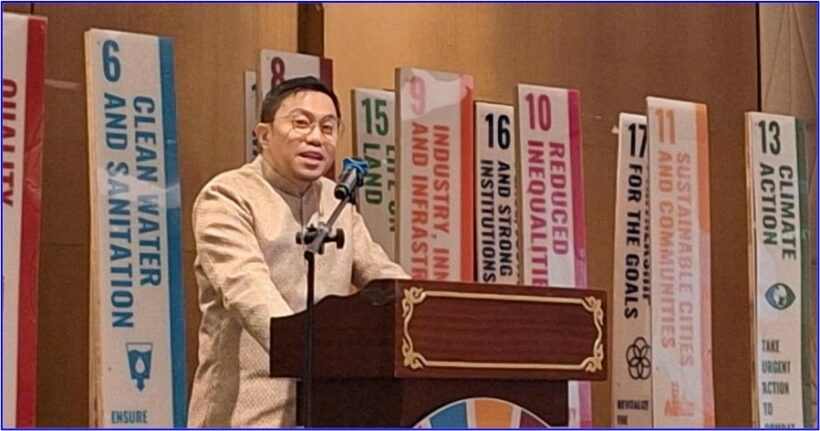 Mr. Aljo Quintans, SDG Specialist, UNDP Philippines, reiterated the shared commitment to sustainable development. He emphasized that the VLR was a “powerful tool” to listen to the people’s voices and drive urgent action. Photo Credit: Michael T. Sebullen.
Mr. Aljo Quintans, SDG Specialist, UNDP Philippines, reiterated the shared commitment to sustainable development. He emphasized that the VLR was a “powerful tool” to listen to the people’s voices and drive urgent action. Photo Credit: Michael T. Sebullen. Looking back at the August 24 Inception Workshop, key figures including Marlene de Castro (Chair, Peoples Council), UNDP SDG Specialist Aljo Quintans, and Arch. Donna R. Tabangin (CPDSO Head, rear row, 6th–8th from left) joined representatives from UNDP Philippines, the local government, civil society, and academe. Baguio Central University was represented by Dr. Genevieve B. Kupang and Sir Karl Rillera (front row, 2nd and 1st from right). Photo credit: UNDP Phil. (2025), Baguio City VLR on the SDGs, p. 156.
Looking back at the August 24 Inception Workshop, key figures including Marlene de Castro (Chair, Peoples Council), UNDP SDG Specialist Aljo Quintans, and Arch. Donna R. Tabangin (CPDSO Head, rear row, 6th–8th from left) joined representatives from UNDP Philippines, the local government, civil society, and academe. Baguio Central University was represented by Dr. Genevieve B. Kupang and Sir Karl Rillera (front row, 2nd and 1st from right). Photo credit: UNDP Phil. (2025), Baguio City VLR on the SDGs, p. 156.
Voices of Commitment and Collaboration
The VLR launch served as a powerful platform for diverse voices to express their unwavering commitment:
- Jessica Amila Bilat, representing the Youth, celebrated the VLR process as a means to empower young change-makers and inspire broader contributions to the city’s sustainable future.
- Ma’am Arlene B. De Castro from the Baguio City Peoples Council and Civil Society Organizations affirmed the sector’s pivotal role in elevating grassroots insights into policy, ensuring that “participatory development principles were heard.” She stressed the need for accountable and adequate funding to strengthen organizations and advocate for systemic change.
- Dr. Thelma Palaoag from the University of the Cordilleras, representing the Academe, reaffirmed institutions’ commitment as “the education center of the North” to integrate SDGs into curricula, foster university-community partnerships, and contribute intellectual pursuits to locally relevant solutions.
- City Councilor Jose Molintas, Indigenous Peoples Representative, emphasized that sustainability is “nothing new” to indigenous communities, whose traditional knowledge systems have long ensured food security and ecological balance. He stressed the importance of honoring traditional knowledge, promoting cultural rights, and protecting land rights as fundamental to preserving cultural identity.
- Atty. Rev. Pure Sapaen, Governance Staff Director from the Department of Economy, Planning and Development (DEPDEV), underscored that the VLR is a “powerful reflection” of Baguio’s current standing and aspirations. She highlighted two key lessons: the city’s commitment to data-driven, inclusive solutions that empower diverse voices, and its readiness to embrace innovation and futures-thinking to build a resilient and livable city.
A Glimpse into the Future: AI and Human Development
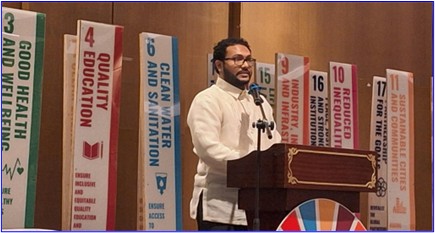 Mohamed Shahudh, economist, UNDP Phil. presents key insights from the 2025 Human Development Report -a matter of choice: people and possibilities in the age of AI. Photo credit: Michael T. Sebullen.
Mohamed Shahudh, economist, UNDP Phil. presents key insights from the 2025 Human Development Report -a matter of choice: people and possibilities in the age of AI. Photo credit: Michael T. Sebullen.
The launch’s segment included a presentation on the 2025 Human Development Report, “A Matter of Choice: People and Possibilities in the Age of AI,” by Mohamed Shahudh of UNDP Human Development Report Office. This discussion explored how AI could either deepen existing divides or be leveraged to enhance human capabilities, emphasizing that AI’s voice reflects its creators, often biased towards high-income settings. Key strategies for leveraging AI for human development include building a complementarity economy, fostering innovation with intent, and investing in capability training, particularly in STEM education, to reduce income inequality. The urgency of addressing energy consumption for AI readiness was also highlighted.
In her closing remarks, Ar. Donna Tabangin expressed deep gratitude to the UNDP for elevating Baguio’s capacity for evidence-based planning. She emphasized that the VLR is a testament to the “best collaborative work” within the local government and its residents. This report will serve as a tool for implementation, monitoring, and tracking Baguio City’s progress towards its sustainable future.
The VLR launch reaffirms Baguio City’s commitment to leaving no one behind, fostering an inclusive ecosystem where innovation, data-driven decisions, and the collective intelligence of its people pave the way for a truly loved and sustainable Baguio – echoing the national aspiration of a “Maginhawa, Matatag, and Panatag” (Comfortable, Stable, and Secure) Philippines by 2040.
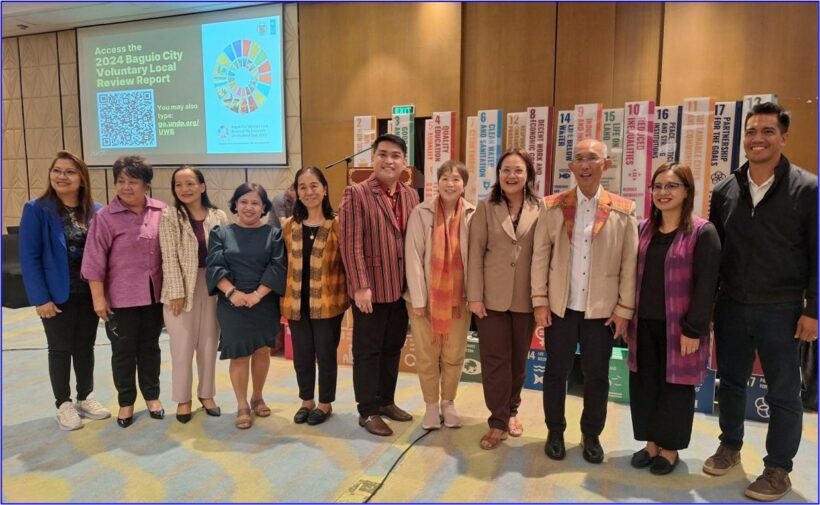 Baguio Central University participated in the city’s VLR launch, joining Mayor Benjamin Magalong and other key leaders in this historic event. Represented by Dr. Elma Donaal, Dr. Genevieve B. Kupang, and Dr. Michael Sebullen, BCU reaffirms its commitment to advancing Baguio’s vision of a city that is inclusive, livable, and creative for everyone.
Baguio Central University participated in the city’s VLR launch, joining Mayor Benjamin Magalong and other key leaders in this historic event. Represented by Dr. Elma Donaal, Dr. Genevieve B. Kupang, and Dr. Michael Sebullen, BCU reaffirms its commitment to advancing Baguio’s vision of a city that is inclusive, livable, and creative for everyone.






